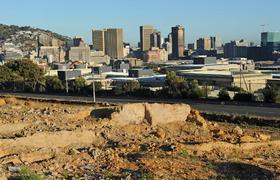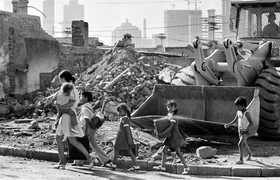District Six: ‘a community where love and compassion trumped everything’
11 February 2021 | Story Niémah Davids. Photos Lerato Maduna. Voice Neliswa Sosibo. Read time 9 min.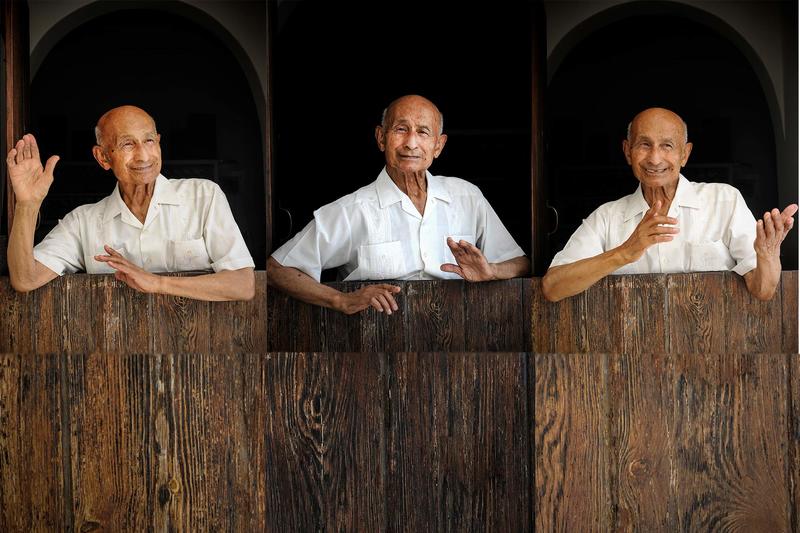
Ahead of 11 February – the 55th anniversary of District Six being declared a whites-only area – ballet master, University of Cape Town (UCT) alumnus and honorary doctorate recipient Johaar Mosaval shared his memories of the much-loved community.
When the young Mosaval left his home in District Six in the early 1950s, he had big dreams of kick-starting an illustrious career as a ballet dancer in London. He had high hopes of returning to the community he knew and loved as an internationally acclaimed superstar.
His career set off rapidly. Upon his arrival in London, he became Sadler’s Wells Ballet’s (later the Royal Ballet) first black student. He made history when he took to the stage in 1953 at one of the most prestigious events of the 20th century: the celebration of the coronation of Elizabeth II at the Royal Opera House in London. Owing to his exceptional talent and several outstanding performances, he become the first black South African to achieve the status of senior principal dancer at the Royal Ballet, a position he held for more than two decades.
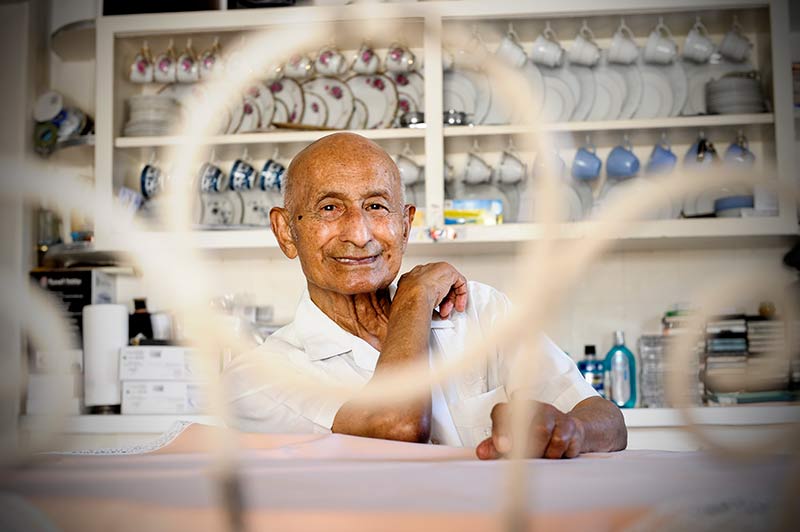
But before all the glitz and glamour, Mosaval, or Uncle Johaar as he’s affectionately known, trained at UCT’s Ballet School, now the Centre for Theatre, Dance and Performance Studies. Fast-forward almost seven decades to March 2020, which saw the university awarding the ballet master with an honorary doctorate in recognition of his enormous contribution to the arts.
But a lot happened in between, including his family’s move from their beloved District Six to Lansdowne in Cape Town. On the eve of the 55th anniversary of District Six being declared a whites-only area, UCT News masked up and visited Mosaval at his Lansdowne home. He shared some personal anecdotes on the community he holds so close to his heart and yearns to return to.
A bittersweet homecoming
Sadly, for Mosaval, his return to Cape Town seven years after he initially left for London was bittersweet. The joy of seeing his parents, nine siblings and extended family and friends warmed his heart. But one thing was very different – the family’s home in District Six was no more.
“It was strange coming to a new home; to a home I didn’t know.”
“It was strange coming to a new home; to a home I didn’t know,” he said.
Mosaval’s parents and siblings relocated to Lansdowne shortly after the apartheid government passed the Group Areas Act in 1950. Subsequently, District Six was officially declared a whites-only area 16 years later on 11 February 1966.
What followed was a period of uncertainty and fear, and later heartache, as the apartheid government ripped the close-knit community apart, bulldozed houses and forced thousands of residents to flee from their homes. Many were moved to the outskirts of the city to what is known today as the Cape Flats, and where promises of a better life remain unfulfilled.
Mosaval said that he vividly remembers receiving a letter from his mother in 1952, shortly after he arrived in London.
“She wrote to tell me that there was talk in the community that everyone would be moved from the area. I could sense in the letter that she was afraid. She said she didn’t know where they would be moved to. I was scared too,” he said.
Mosaval said that he almost immediately got in touch with a friend who worked in the property industry in Cape Town. His friend located the Lansdowne house that became their new family home, which included a large plot adjacent to it, and Mosaval funded both with his first salary.
“The move was difficult for my family. All they knew and loved was in District Six. Can you imagine what it felt like to leave?”
A one-of-a-kind community
A community like no other is how Mosaval remembers District Six – from the fresh fish market on bustling Hanover Street to the ubiquitous little corner shops that sold just about everything. And not forgetting the spirit of ubuntu, which had been common among residents there.
“Oh, it was truly something else to have lived there. It was something amazing. People lived harmoniously, people shared what they had, even though many had very little,” he said.
Mosaval was born at 1 Little Lisa Street in District Six, and true to its name, the road was in fact “quite little” – there were only five houses there. His parents had rented a room from an Indian family who owned a butchery nearby.
The house was just a stone’s throw from the iconic seven steps, a flight of granite steps situated in the heart of District Six, and Mosaval has fond memories playing on those steps with his cousins.
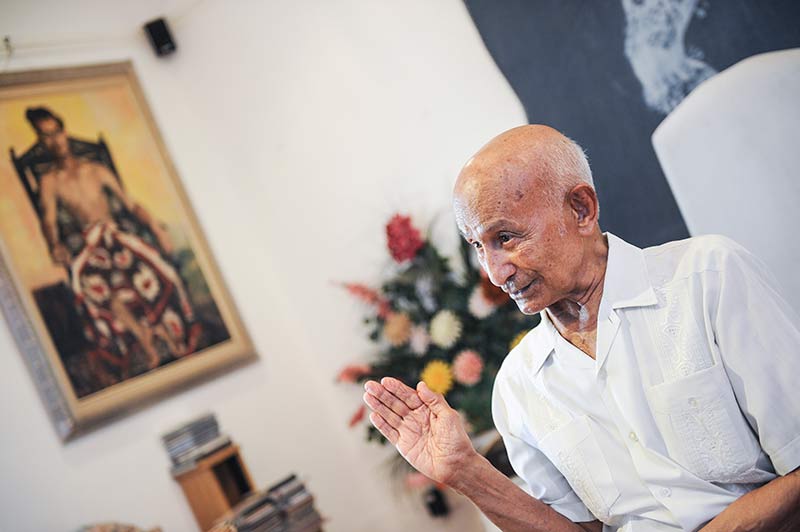
“I like to refer to the seven steps as my playground. My mother often used to send me out to play there when she needed to do things around the house and I was getting in the way. She always peeped out and watched me from the stoep.”
Mosaval said that his family grew quickly. Suddenly, living in a single bedroom became too cramped for his parents. The family moved house twice before finally settling in on the bottom floor of his grandparents’ house.
“Before my grandfather left for pilgrimage, he asked my parents if they would consider moving in with my grandmother. They agreed, and they stayed there until the move to Lansdowne,” he said.
A different calibre of people
For the community and its people, Mosaval has nothing but praise.
“I can tell you this, I don’t have a single bad word to say about District Six. We had our ups and downs, but we had so much love for one another – and that was priceless,” he said.
With a distant look in his eyes, he turned back the clock more than half a century and took a stroll down memory lane.
He spoke of a community where honesty, integrity and respect were the foundation of everyone’s lives; where religion, race, class and creed were non-existent; and where love and compassion for one another trumped just about everything.
“District Six had skollies (gangsters), but they were nothing compared to the ones we find today.”
“District Six had skollies (gangsters), but they were nothing compared to the ones we find today. They were gentlemen – anyone could walk freely at any time of the day or night and they wouldn’t interfere with you. In fact, often they would escort the ladies home safely late at night. That’s the kind of love we had,” he said.
Mosaval, a devout Muslim, said that despite religious differences, residents respected their neighbours’ religious beliefs “150% of the time”. Christian, Hindu, Muslim and Jewish, District Six had it all and everyone cared for one another regardless.
“I am Muslim, but I received Christmas gifts at Christmas – I even knew hymns. This was the case for so many children because Muslim children went to Sunday School with their Christian friends,” he said with a chuckle.
Longing to return to District Six
Mosaval, 93, and the 2019 recipient of the Order of Ikhamanga in Gold, awarded by President Cyril Ramaphosa, said that he longs to return to District Six. If he had a choice, he added, he’d opt for a house on or near Hanover Street.
“We were stopped from living there – not because we did anything wrong, but because we were black, and that needs to be rectified.”
But despite lodging an application to return to the area under the Restitution of Land Rights Act many years ago, Mosaval said that there’s no trace of his application.
“I applied to return, but they told me my documents disappeared. I am not sure how that happened, but they’re gone. I would love to be among those who will return to District Six, but I am not sure what else to do now,” he said.
“It’s only right that we get to go back there. That was our home, our community.
“We were stopped from living there – not because we did anything wrong, but because we were black, and that needs to be rectified.”
 This work is licensed under a Creative Commons Attribution-NoDerivatives 4.0 International License.
This work is licensed under a Creative Commons Attribution-NoDerivatives 4.0 International License.
Please view the republishing articles page for more information.









